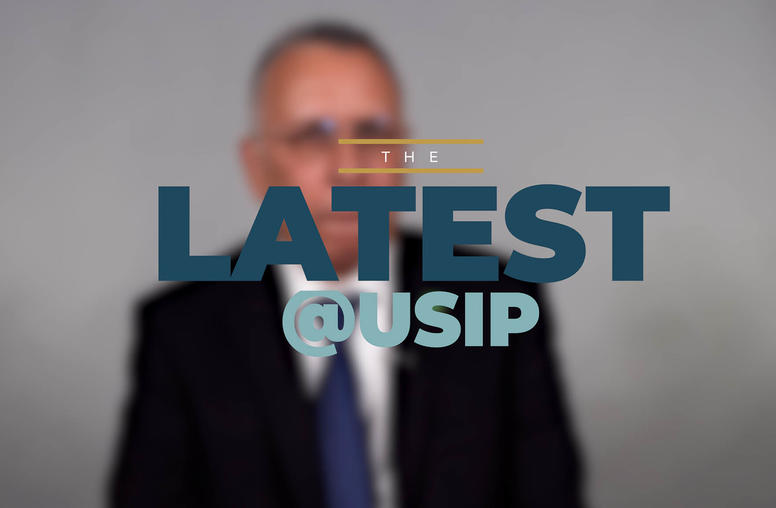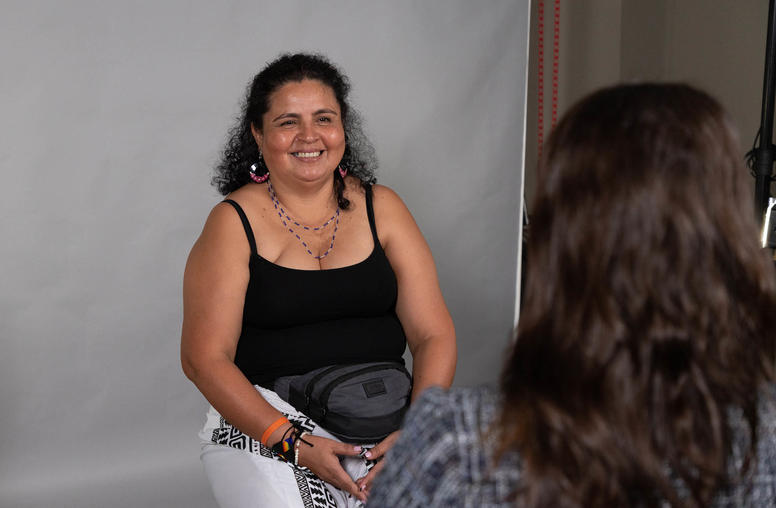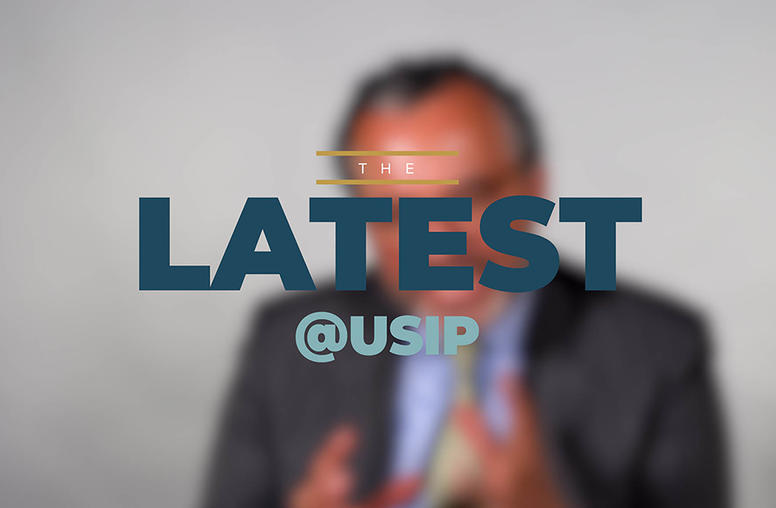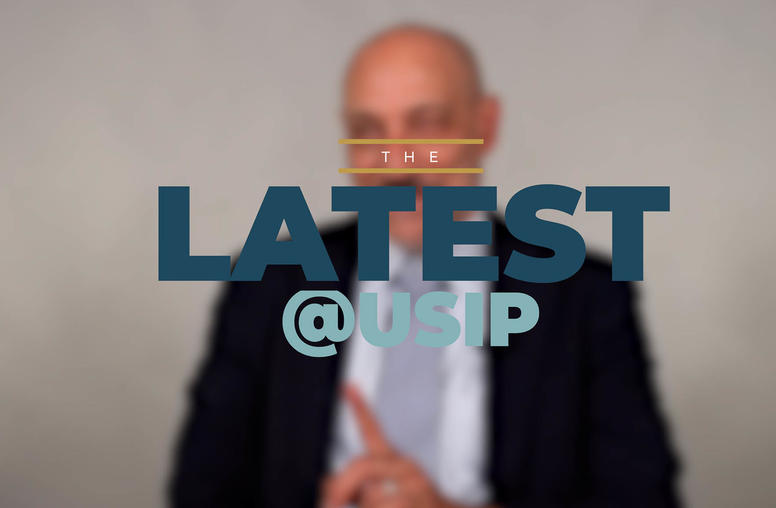Tuesday, April 23, 2024

The Latest @ USIP: Peacebuilding Lessons from Northern Ireland’s Religious Actors
One of the keys to the Northern Ireland peace process was patience — and with it, a long-term commitment from religious actors to pursue nonviolent avenues of ending the conflict. Reverend Gary Mason, a senior research fellow at Maynooth University, discusses how longstanding relationships between religious actors and their communities can open doors for dialogue that might be unavailable to other peacebuilders and how his experience in Northern Ireland can inform his new work to promote peace in the Middle East.

The Latest: Three Things to Know About the U.S.-Africa Security Partnership
USIP’s African Diplomat Seminar offers newly arrived diplomats a chance to connect with the U.S. policymakers, agencies and departments working on advancing U.S.-Africa policy. Stanley Makgohlo, political counselor at the South African Embassy, and Oluwafemi Gbadebo, minister in the Nigerian Embassy, discuss how the seminar has helped their work at the nexus of peace and development and how the growing U.S.-Africa partnership can help address the challenges facing their country.

The Latest @ USIP: Why Partnerships Between Women and Civil Society Matter
From Sri Lanka to Uganda, women in civil society have been the driving force behind some of the most effective mediation efforts in conflict areas. Sanam Naraghi Anderlini, MBE, founder and CEO of the International Civil Society Action Network, discusses the three components that make up a successful partnership between women and civil society: recognition of women peacebuilders' expertise, solutions and analysis; protection for women that risk their lives; and effective resourcing and funding so that they can build trust within their communities.

The Latest @ USIP: Fighting for Human Rights in the Sahel
Amid the Sahel struggles with coups, insurgencies and extremism, protecting and promoting human rights is a particularly thorny challenge. Mamadou Kiari Liman-Tinguiri, Niger’s ambassador to the United States, and Maître Ahmed Salem Bouhoubeyni, president of Mauritania’s National Human Rights Commission, discuss the vital role that human rights organizations play in the Sahel and lessons from Niger’s effort to institutionalize human rights.

The Latest @ USIP: María Eugenia Mosquera Riascos on Advancing Peace in Colombia
As Colombia’s peace process moves forward, organizations like Comunidades Construyendo Paz en Colombia (CONPAZCOL) — an association of victims made up of black, indigenous and rural families and communities — are working amid immense challenge to help build a “comprehensive peace,” as María Eugenia Mosquera Riascos calls it. Mosquera Riascos, a legal representative of CONPAZCOL and recipient of the 2022 Women Building Peace Award, discusses the situation for youth and peacebuilders in Colombia and what her group does to help them, and talks about how the Women Building Peace Award has aided her work.

The Latest @ USIP: Achieving Justice After 50 Years of Conflict in Colombia
Following some 50 years of armed conflict, the Colombian government and FARC rebels signed a landmark peace agreement in 2016. Part of that agreement called for the establishment of a Special Jurisdiction for Peace (JEP), a transitional justice court that relies on international law to investigate crimes committed during the conflict and to protect victims’ rights. Roberto Vidal, the president of the JEP, explains how the court works and how restorative justice can counter impunity for war crimes.

The Latest @ USIP: How Russia Extends Influence in Latin America
Russia’s information operations in Latin American are much deeper and more complex than what is commonly understood. Using a variety of instruments, Moscow has worked to create an environment favorable to Russia and to keep Latin American elites from aligning with Washington on a variety of issues, particularly the war in Ukraine. Douglas Farah, the director of the USIP-funded Russia and Latin America project, explains how Russia deploys information operations in Latin America, what the objective of these efforts is, and what is most concerning about Moscow’s effort to advance its influence in Latin America.

The Latest: 3 Things to Know on Rohingya Refugees in Bangladesh
In August 2017, Myanmar’s military drove around 750,000 Rohingya Muslims into Bangladesh. The Bangladeshi government and citizens responded generously, providing food, shelter and other forms of assistance. But a USIP survey shows that Bangladeshis' views on the situation have markedly changed in the last five years, with many supporting less assistance and harsher policies toward the Rohingya. USIP’s Geoffrey Macdonald, who is also a senior advisor for Asia at the International Republican Institute, discusses why Bangladeshi views have evolved, what conflict dynamics inside and outside of refugee camps look like, and what policymakers should do to help address the situation.

The Latest @ USIP: To Improve Stability in Africa, Invest in Agriculture
To improve continental stability, African countries need to focus on the equitable creation of wealth for their citizens. And with farmers representing over 70 percent of the continent’s population, the path toward equitable wealth involves improving the durability and development of Africa’s largest industry: agriculture. Akinwumi Adesina, president of the African Development Bank, discusses how food insecurity stemming from the war in Ukraine has refocused investment in African farmers, why improving infrastructure is the key to unlocking more foreign investment in African countries, and how the private sector can help promote peace throughout the continent.

The Latest @ USIP: Côte d'Ivoire’s Struggle Against Cross-Border Violent Extremism
While Côte d'Ivoire has managed to professionalize its security forces and maintain relative calm in the country’s interior regions, concerns over violent extremism continue to plague its northern borders with countries like Mali and Burkina Faso. Vagondo Diomandé, Côte d'Ivoire’s minister of interior and security, discusses the country’s security landscape, his first impressions of the U.S. Strategy for Conflict Prevention and Stability Promotion in Coastal West Africa, and why a regional security approach is the only way to fully address the cross-border threat of terrorism.
